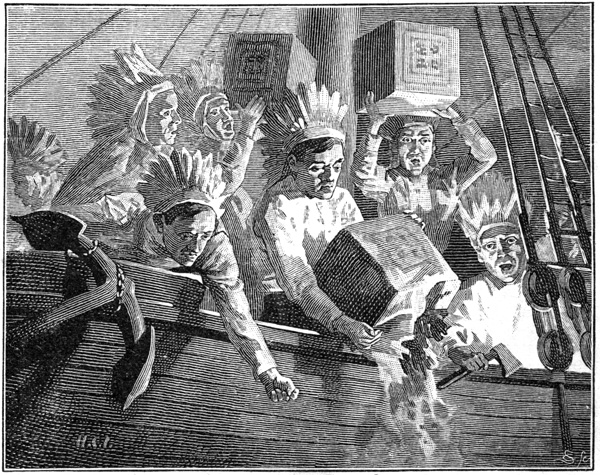destruction of property? i think yes
I thought this would be a pretty good tactic; no red-blooded, patriotic American can reject the country's uber-event, the American Revolution, in which the oppressed Americans through off their British overlords and established a new government...right? Wrong.
"That was different," my coworker said. "[The occupiers] are just a bunch of dirty hippies that want to bitch. They are just complaining about banks."
these guys look pretty clean cut to me...
That got me thinking. Are the #OWS people really that different from the Boston Tea Partiers we honor as heroes in every American classroom? My quick response to my coworker was that maybe today's protesters aren't all that different.
"They weren't hippies, but that's because that word and culture didn't exist then. But they probably were just as dirty, seeing as how bathing wasn't all that regular in the late 1700s." But those points were a bit trivial. Were the actual actions and desires of the Revolutionary protesters similar to those of the Wall Street occupiers?
"They are just complaining about banks." Hmmm. Well, assuming that's an accurate portrayal of the #OWS movement - which it's not - I think there are still similarities. The "complaining about banks" is rooted in an unjust distribution and power over wealth, and I think that this could equally apply to the American Revolutionaries.
Of course, the people of #OWS are upset about more than just banks. They are fighting a legal system that enables those banks to benefit at the gross expense of others. One of the big talking points has been about the unequal distribution of taxes. Occupiers believe that the wealthy are unfairly advantaged by our country's tax code. Now, if you remember anything from middle and high school American history, you know that the American Revolution had a lot to do with taxes. The Stamp Act. The Intolerable Acts. The Sugar Act. The Townshend Acts. Those are the more common artifacts we teach our children when discussing the American Revolution, with the explicit understanding that those taxes were unfair and that the patriots were justified in rebelling against them. "No taxation without representation" is taught as the slogan of the American Revolution. Clearly, the issue of taxation is central to both movements.
Then, there's the allegation of unjust violence and destruction. Obviously the American patriots were destructive. Dumping the British East India company's tea into the harbor (I wonder if it was enough to make the ocean taste like English breakfast?), setting houses on fire. But were they violent? It's safe to assume, yes. The practice of tarring and feathering, depicted in probably every American history textbook, was certainly violent enough. Tax officers and other loyalists were physically restrained, denuded, rolled around in hot tar, and covered in feathers to be paraded around town for public ridicule. Although we revere our patriotic ancestors, I'd say that a lot of Americans today wouldn't be all that comfortable with the practice of, say, ripping the clothes off of police officers or wall street executives and covering them in glue and feathers. In fact, they would most certainly be arrested.
should #OWS employ this strategy?
Now, this isn't to say that we should be forming mobs, attacking the rich, stripping their clothes, tarring and feathering them, and burning their houses. But I'm also not going to say that we shouldn't. My point is that the opposition to the #OWS movement has arguments that are at least legitimate, even if I might not agree with them. However, those same arguments applied to celebrated moments of our history would force us to reevaluate our opinions of those celebrated moments. Does that mean that we should understand the American patriots as terrorists? Should we acknowledge that the #OWS movement is doing something very similar to what the American patriots did?
I think there are moments when breaking the law and getting aggressive become necessary and justified. I've just tried to make the comparison to the American Revolution, in light of my conversation with my co-worker. There are many other moments in history that would fit the bill. Fighting slavery in the American South in the 1800s. Resisting the Nazi aligned Vichy regime in France in the 1940s. Is Occupy Wall Street of the same caliber? If you don't think so, where would stand if you instead existed in those other moments in history? How do you reconcile your belief in American independence and the abolition of slavery with your denial of the #OWS movement to fight the injustices that they see in their world?
track I'm currently listening to:
track I'm currently listening to:
- Tim Pool's live Ustream of the aftermath of the Zuccotti park raid




